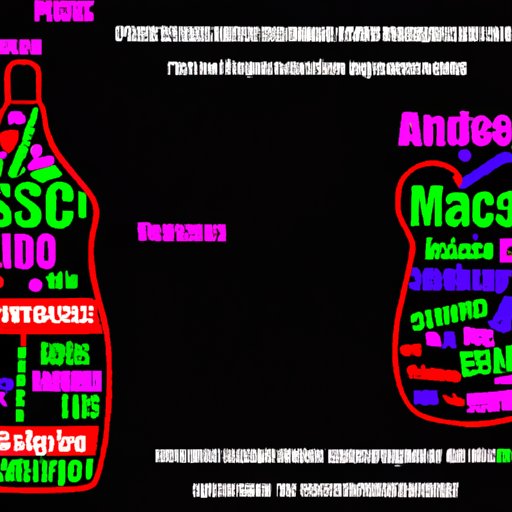Introduction
Consumer culture is a term used to describe the way that consumption shapes our lives and societies. It refers to the idea that people are increasingly driven by materialistic desires, resulting in an ever-increasing focus on buying and consuming goods. This has become a dominant feature of modern life, with many of us feeling pressure to consume more than we need or can afford.
In this article, we will explore what consumer culture is and how it affects society and the environment. We will look at the drivers of consumerism, the impacts of advertising, the psychology behind it, and evaluate the pros and cons. By understanding consumer culture and its implications, we can make more informed decisions about our own consumption habits.

Analyzing the Impact of Consumer Culture on Society
Consumer culture has had a significant impact on society, both positive and negative. On one hand, increased consumption can lead to greater economic growth, while on the other, it can lead to increased inequality and environmental degradation.
Social Effects
The rise of consumer culture has been linked to a number of social changes. According to research conducted by the University of Oxford, “the rise of consumer culture has resulted in a shift away from traditional values such as community and family, towards individualistic values such as materialism and self-promotion.” 1 This shift has led to a focus on status and appearance, leading to higher levels of anxiety and depression among young people.
Economic Effects
On the economic front, consumer culture has been linked to both positive and negative effects. On the one hand, increased consumption can lead to greater economic growth, as more money is spent on goods and services. On the other hand, it can lead to increased inequality, as those with more money are able to purchase more goods than those with less. In addition, it can also lead to lower savings rates, as people are more likely to spend rather than save their money.

Exploring the Drivers of Consumerism
There are several factors that have contributed to the rise of consumer culture. These include the availability of credit, the influence of advertising, and the desire to fit in and achieve status.
Availability of Credit
The availability of credit has made it easier for people to buy goods and services they may not be able to afford. According to the Federal Reserve Bank of San Francisco, “easy access to consumer credit has allowed households to increase their spending without having to save first.” 2 This has led to increased consumption, as people are able to buy items they would not otherwise be able to afford.
Advertising
Advertising plays a major role in consumer culture. Companies use advertising to create a sense of desire for their products, encouraging consumers to purchase them even if they do not necessarily need them. Research conducted by the American Psychological Association found that “advertising can have a powerful influence on consumer behavior, creating a strong urge to purchase products.” 3
Status Seeking
The desire to achieve status has also been linked to increased consumption. People often use material possessions as a way to signal their wealth and status, and companies use this knowledge to target consumers with products they believe will give them a sense of status. According to research conducted by the University of Chicago, “status seeking is a key driver of consumer behavior, as people are willing to pay a premium for goods and services that convey a sense of status or prestige.” 4
Examining How Consumer Culture Affects the Environment
Consumer culture has had a significant impact on the environment. Increased consumption leads to increased waste generation and resource depletion, which can have a damaging effect on the planet.
Waste Generation
Increased consumption leads to increased waste generation. The production of goods requires resources, which must then be disposed of once they are no longer needed. This can lead to pollution and other environmental damage, as well as putting a strain on landfills.
Resource Depletion
Consumer culture also leads to increased resource depletion. The production of goods requires resources, such as oil and minerals, which are becoming increasingly scarce. This has the potential to cause shortages of essential materials, as well as leading to environmental degradation.

Investigating the Role of Advertising in Consumer Culture
Advertising plays a major role in shaping consumer culture. Companies use targeted advertising to create a sense of desire for their products, encouraging people to purchase them even if they do not necessarily need them.
Targeting Consumers
Companies use targeted advertising to reach specific groups of consumers. This allows them to tailor their messages to certain demographics, such as age, gender, and income level. This makes it easier for companies to sell their products, as they can target people who are most likely to purchase them.
The Influence of Media
Advertising is not the only factor influencing consumer culture. The media also plays a role, as it can shape public opinion and attitudes towards certain products and brands. For example, celebrity endorsements can make a product seem desirable, while negative reviews can turn people away from a product.
Understanding the Psychology Behind Consumer Culture
Consumer culture is based on psychological principles. People are drawn to the idea of instant gratification, as well as the desire to fit in and achieve status. Understanding these motivations can help us better understand why people are so drawn to consumer culture.
The Need for Instant Gratification
People are naturally drawn to the idea of instant gratification. The ability to purchase goods quickly and easily gives people a sense of satisfaction and accomplishment. This can lead to increased consumption, as people are more likely to purchase items they may not actually need.
The Desire to Fit In
The desire to fit in is another major motivation behind consumer culture. People often use material possessions as a way to signal their wealth and status, and companies use this knowledge to target consumers with products they believe will give them a sense of belonging.
Evaluating the Pros and Cons of Consumer Culture
Consumer culture has both benefits and drawbacks. On the one hand, it can lead to economic growth and increased access to goods and services. On the other hand, it can lead to increased inequality, environmental degradation, and a focus on status and appearance.
Benefits of Consumer Culture
One of the main benefits of consumer culture is that it can lead to economic growth. Increased consumption leads to increased demand for goods and services, which can result in job creation and higher wages. It can also lead to increased access to goods and services, as companies are able to produce more products due to increased demand.
Potential Drawbacks of Consumer Culture
On the other hand, there are also potential drawbacks to consumer culture. It can lead to increased inequality, as those with more money are able to purchase more goods than those with less. In addition, it can also lead to environmental degradation, as increased consumption leads to increased waste generation and resource depletion. Finally, it can lead to a focus on status and appearance, as people are drawn to material possessions as a way to signal their wealth and status.
Conclusion
Consumer culture is a dominant feature of modern life, and it has had a significant impact on society and the environment. While it can lead to economic growth and increased access to goods and services, there are potential drawbacks, such as increased inequality, environmental degradation, and a focus on status and appearance. By understanding consumer culture and its implications, we can make more informed decisions about our own consumption habits.
(Note: Is this article not meeting your expectations? Do you have knowledge or insights to share? Unlock new opportunities and expand your reach by joining our authors team. Click Registration to join us and share your expertise with our readers.)
